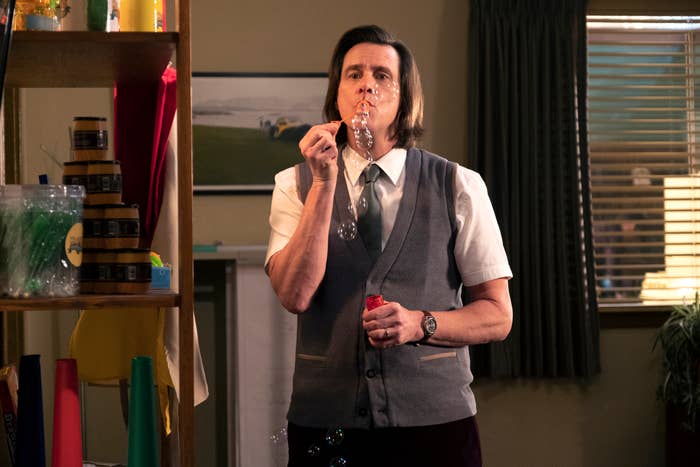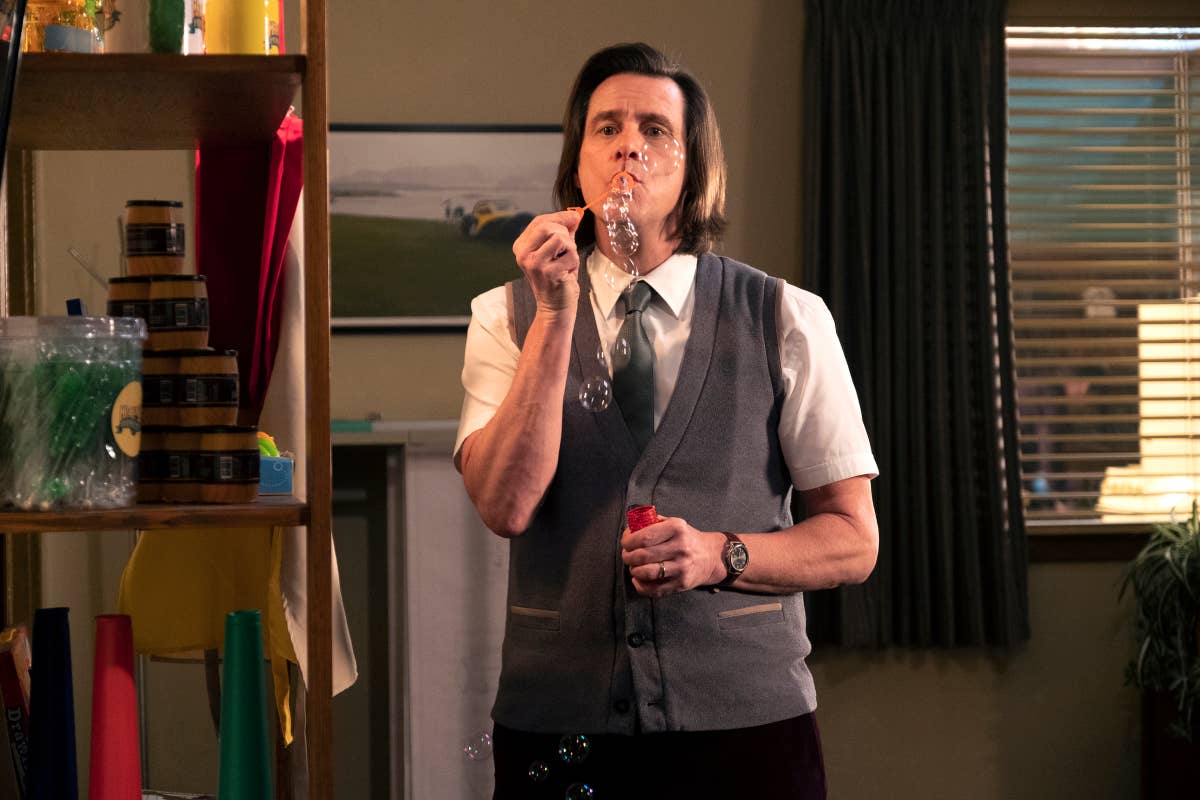
For decades, television had a film inferiority complex, and rightfully so. Before The Sopranos, Breaking Bad, and The Wire redefined what television could be, there was a certain caliber of star that would never do TV. “Doing TV” was an admission that your time in the spotlight had come to an end.
Jim Carrey was the kind of star who would never do TV. From 1994’s Ace Ventura: Pet Detective through 2003’s Bruce Almighty, Carrey was one of the biggest movie stars in the world. As was fitting of his station, he never did television during that period.
Of course, those days are over. Amy Adams, Nicole Kidman, Emma Stone, and JK Simmons have come to television. Meryl Streep, the reigning queen of cinema, will be arriving at HBO shortly. Carrey too has come to the small screen.
Jim Carrey’s new Michel Gondrey-directed project, Kidding, brings up a key problem for this era of A-listers signing up for prestige series: just because someone is willing to do television doesn’t mean they should.
Eternal Sunshine of the Spotless Mind was a generation-defining film effort when it was released in 2004. Gondrey directed Carrey and Kate Winslett in the film about two lovers who decide to erase all memory of each other from their minds. Eternal Sunshine is narratively ambitious and visually dazzling. Carrey offered a subdued performance that managed to maintain the manic twinkle that America fell in love with in his broader comedy films. Winslett, as always, was perfect.
The film returned an impressive $70 million on a $20 million budget. But, that doesn’t tell the full story of how important this Eternal Sunshine was at the time. Gondry joined Spike Jonze and Wes Anderson in the trio of directors who would define the twee hipsterdom of the era when Criterion Collection DVDs were sold at Blockbuster. Winslett’s character Clementine would be cited as one of the definitive examples of the “manic pixie dream girl” archetype along with Natalie Portman’s character from Garden State and Kirsten Dunst’s turn in Elizabethtown.
Eternal Sunshine of the Spotless Mind dominated the indie world in a way no film could hope to in an era where A24 and Annapurna are flooding the zone with quality releases all year long.
Fifteen years later, Carrey and Gondry have reunited in Kidding. They’re joined by Catherine Keener, (a mainstay of that early-aughts indie film era) and the prolific Judy Greer who plays Carrey’s wife. And yet, none of the indie magic that these actors once held seems to have rubbed off here.
The premise seems perfectly tailored for the out-there sensibility that both Gondry and Carrey built their careers on. He plays Jeff Pickles, a thinly veiled Mr. Rodgers type who’s mourning the loss of his son. As is to be expected from a Gondry character, Jeff’s stage persona bleeds into his personal life. In the face of tragedy, the distance between Jeff Pickles the man and Jeff Pickles the character grows thinner by the day.
If this were a vintage Michel Gondry film, this blending of the two worlds would be literalized. We would probably see the puppets from Jeff’s set pop up in his real life. Or maybe his wife and surviving child would appear on his magical set. Or perhaps the ghost of his dead son would haunt all of the proceedings. There would have almost certainly have been a sequence that takes place entirely in Jeff’s mind or in some ethereal dream world.
While Gondry’s actors offer the kind of detached performances that lent an air of the surreal to his films, the visual style simply doesn’t match here. While Eternal Sunshine was a masterpiece of structural daring, the pilot of Kidding unfolds with plodding predictability. Gondry’s films never failed to leave you guessing what would happen next. The awkward dinners and office politics of Kidding’s premiere are beyond predictable if you’ve seen more than one episode of This is Us. Gondry’s films offered only magic; Kidding offers only heavy doses of cold, harsh reality.
If Gondry is lost on television, Carrey is wasted. The man who was once known for his rubber face and high-key catch phrases feels too large for the small screen even when he is doing nothing at all. Carrey is keenly self-aware of his larger than life presence and attempts to register a performance that ranges between listless and apathetic. But, even when playing a character who is not doing very much, he is, well, too much.
Plenty of projects over the years have explored scenarios similar to Kidding. Avenue Q, Happy Time Murders, Death to Smoochy and many other stories have mined the dark underbelly of children’s entertainment. After so many attempts at content in this vein and setting, a new project has to go all-in or else it feels too been there, done that.

It makes sense that the most successful projects to pull-off “kid’s performer gone bad” genre have been films or musicals. It is just easier to sustain a dark, playful, absurd intensity for two hours than it is for ten episodes. Robin Williams’— maybe the closest comparison to Jim Carrey as an actor there ever was—performance as Rainbow Randolph in Death To Smoochy can be called a lot of things, but never restrained, subdued, or boring.
Television is a writer’s medium, and the blame for Kidding’s slow start, is, in part, due to creator Dave Holstein’s writing. Holstein is a veteran of Weeds and Raising Hope, and unfortunately, the mixture of comedy and drama perfected in those shows doesn’t quite come off here. This effort is closer to another of Holstein’s credits, The Brink, which was rarely dramatic enough to be taken seriously or funny enough to make up for that fact.
Misfires on television are common, especially with 400+ shows on the air. It’s just that this effort is particularly disappointing because Kidding reunites two people who once worked so well together.
The good news is that the films of Michel Gondry and Jim Carrey aren’t going anywhere. You can always click away on a double feature of Eternal Sunshine and Dumb and Dumber until Kidding, hopefully, lives up to the potential of the creative forces behind it.
Unlike Kidding, these old standbys will never disappoint you.

